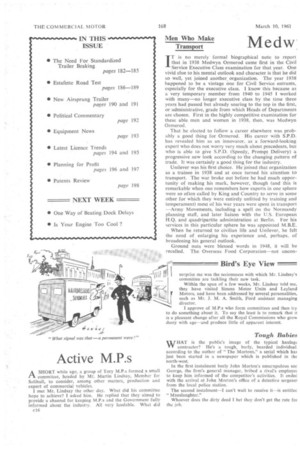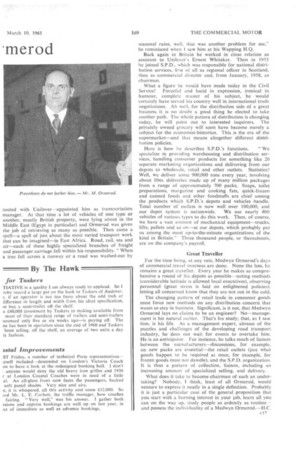Men Who Make Transport
Page 54

Page 55

If you've noticed an error in this article please click here to report it so we can fix it.
Medw
imerod
IT is no merely formal biographical note to report that in 1938 Medwyn Ormerod came first in the Civil Service Executive Class examination for that year. One vivid clue to his mental outlook and character is that he did so well, yet joined another organization. The year 1938 happened to be a vintage one for Civil Service entrants, especially for the executive class. I know this because as a very temporary member from 1940 to 1945 I worked with many—no longer executive class by the time three years had passed but already soaring to the top in the first, or administrative, grade from which Heads of Departments are chosen. First in the highly competitive examination for these able men and women in 1938, then, was Medwyn Ormerod.
That he elected to follow a career elsewhere was probably a good thing for Ormerod. His career with S.P.D. has revealed him as an innovator, as a forward-looking expert who does not worry very much about precedents, but who is able to give S.P.D. (Speedy, Prompt Delivery) a progressive new look according to the changing pattern of trade. It was certainly a good thing for the industry.
Unilever was his first choice. He joined that organization as a trainee in 1938 and at once turned his attention to transport. The war broke out before he had much opportunity of making his mark, however, though (and this is remarkable when one remembers how experts in one sphere were so often called by King and Country to serve in some other for which they were entirely unfitted by training and temperament) most of his war years were spent in transport —Army Movements, including a spell on the Normandy planning staff, and later liaison with the U.S. European H.Q. and quadripartite administration at Berlin. For his services in this particular sphere he was appointed M.B.E. When he returned to civilian life and Unilever, he felt the need of enlarging his experience and, perhaps, of broadening his general outlook.
Ground nuts were blessed words in 1948, it will be recalled. The Overseas Food Corporation—not uncon
fleeted with Unilever—appointed him as transportation manager. At that time a lot of vehicles of one type or another, mostly British property, were lying about in the Middle East (Egypt in particular) and Ormerod was given the job of retrieving as many as possible. Then came a spell—a spell of just about the most varied transport work that can be imagined--in East Africa. Road, rail, sea and air—each of these highly specialized branches of freight and passenger carriage fell within his responsibility. "When a tree fell across a runway or a road was washed-out by seasonal rains, well, that was another problem for me," he reminisced when I saw him at his Wapping H.Q.
Back again in Britain he worked in close relation as assistant to Unilever's Ernest Whitaker. Then in 1953 he joined S.P.D., which was responsible for national distribution services, first of all as regional officer in Scotland, then as commercial director and, from January, 1958, as chairman.
What a figure he would have made today in the Civil
Service! Forceful and lucid in expression, ironical in humour, complele master of his subject, he would certainly have served his country well in international trade negotiations. Alt well, for the distribution side of a great business it is no doubt a goad thing he elected to take another path. The whole pattern of distribution is changing today, he will point Out to interested inquirers. The privately owned grocery will soon have become merely a sobject for the economist-historian. This is the era of the supermarket—and that means altogether different distribution policies.
Here is how he describes S.P.D.'s functions. "We specialize in providing warehousing and distribution services, handling consumer products for something like 20 separate marketing organizations and delivering from our depots to wholesale, retail and other outlets. Statistics? Well, we deliver sonic 900,000 tons every year, involving about 10m. deliveries made up of many million packages from a range of approximately 700 packs. Soaps, toilet preparations, margarine and cooking fats, quick-frozen and canned foods and other foodstuffs are chief among the products which S.P.D.'s depots and vehicles handle. Total number of outlets is now well over 100,000, and our depot systeni is nationwide. We use nearly 800 vehicles of various types to do this work: Then, of course., we have a vast amount of mechanical equipment—trucks, lifts, pallets and so on—at our depots, which probably put us among the most up-to-the-minute organizations of the kind in Britain." Three thousand people, or thereabouts, are on the company's payroll.
Great Traveller
For the time being, at any rate, Medwyn Ormerod's days
of commercial travel overseas are done. None the less, he remains a great traveller. Every year he makes as comprehensive a round of his depots as possible—noting methods (considerable latitude is allowed local executives), observing personnel (great stress is laid on enlightened policies), letting all concerned know that they are not out in the cold.
The changing pattern of retail trade in consumer goods
must force new methods on any distribution concern that wants to stay in business. Significant, is it not, that Medwyn Ormerod lays no claims to be an engineer? No—management is his natural tiutier. That's his study; that, as I saw him, is his life. As a management expert, abreast of the puzzles and challenges of the developing road transport industry, he does not wait for events to overtake him. He is an anticipator. For instance, he talks much of liaison between the manufacturers—discussions, for example,
on new packs are essential—the retail outlets (just what goods happen to be required at once, for example, for frozen goods must not dawdle), and the S.P.D. organization. It is thus a pattern of collection, liaison, including an increasing amount of specialized selling, and delivery.
What does it take to become chairman of such an undertaking? Nobody, I think, least of all Ormerod, would venture to express it neatly in .a single definition. Probably it is just a particular ease of the general proposition that you start with a burning interest in your job, learn all you can on the way up, study people as ardently as routine-and possess the individuality of a Medwyn Ormerod.-11.C.












































































































































